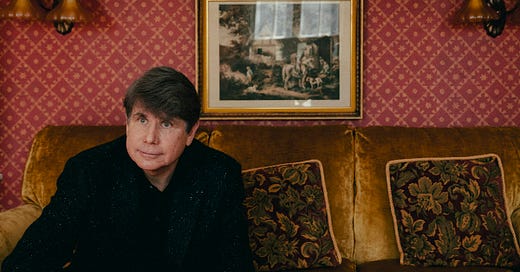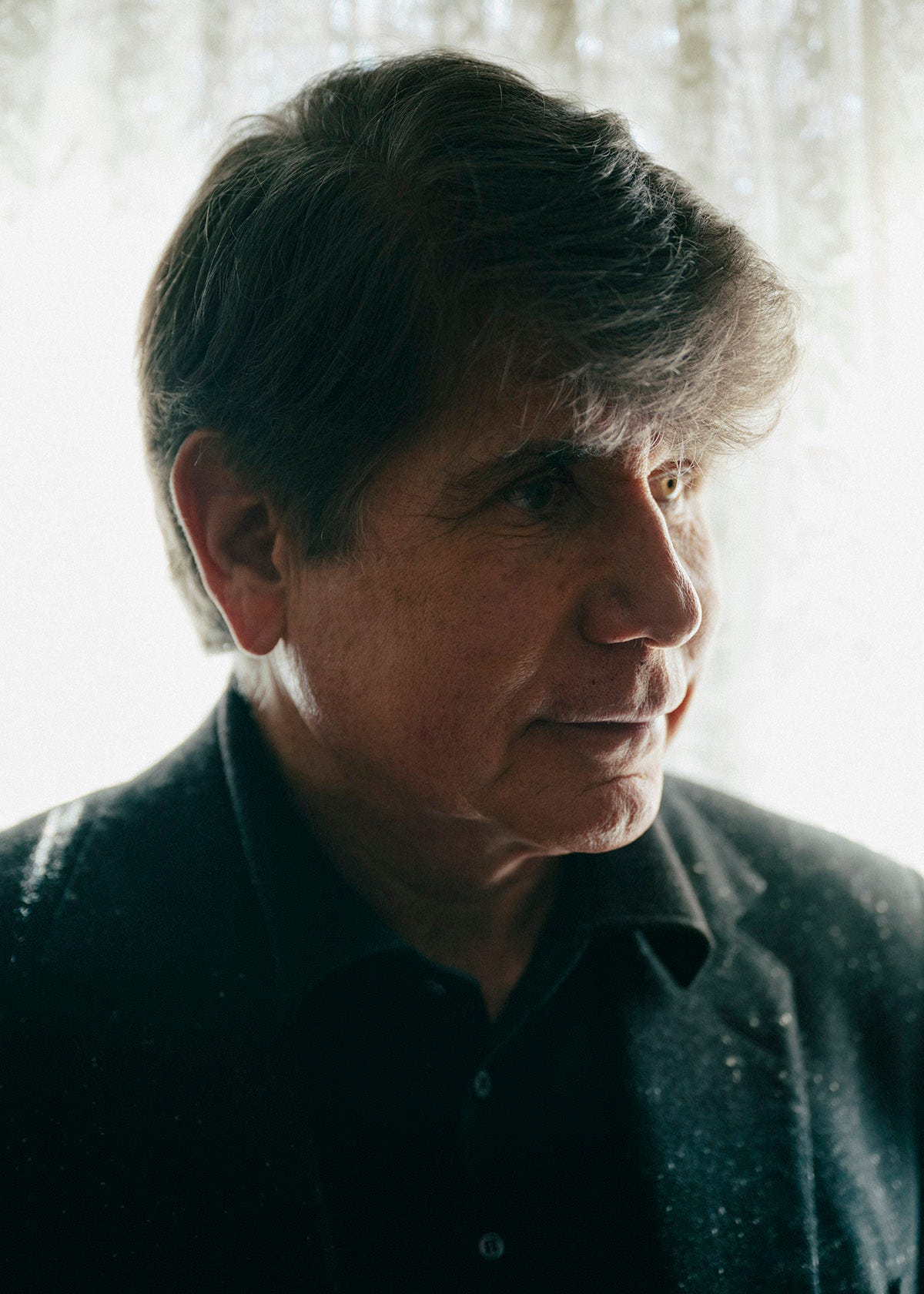
The Free Press

It was a Tuesday morning at Englewood Federal Correctional Institution on June 16, 2015. To Rod Blagojevich, that meant mopping time. It was a duty he liked to carry out while listening to Elvis Presley on the tiny MP3 player he had saved up to buy at the prison commissary.
Once the highest elected official in Illinois, the former governor was, at this point, inmate No. 4089-424. He had been sentenced in 2011 to 14 years in prison for trying to sell off the Senate seat vacated by Barack Obama.
As he cleaned around the TV set, a brunette on the screen caught his eye. Man, that’s Melania, he remembered thinking. Then he saw her husband behind her, the two of them riding down a golden escalator. Soon after, Donald J. Trump cleared his throat for an announcement.
“Ladies and gentlemen, I am officially running for president of the United States,” Trump declared. “We are going to make our country great again.”
While the media thought Trump was a laughingstock, Blagojevich saw him as a potential savior. He had first met the real estate developer on the set of The Celebrity Apprentice in 2010, and said he had shown him “kindness” ever since.
“He’s got a real chance at winning,” Blagojevich told me he thought at the time. “And if Trump’s the president, who knows, maybe I could have a chance at freedom.”
Other inmates, he said, also “thought his candidacy was a joke”—but “Blago,” as he’s known throughout Illinois, was not laughing.
“I knew early on he was going to win—I really believed that. Because people are sick of the bullshit.”
Sure enough, in the home stretch of his first term, Trump commuted Blago’s sentence, sending him home after eight years behind bars.
Blago has never admitted fault, despite the fact that he was caught on a federal wiretap speaking to an adviser, calling the opportunity to fill Obama’s seat “fucking golden.”
Within five minutes of meeting the governor at his home late last month, he told me: “I didn’t do it”—before I even had a chance to ask. For 16 years, he’s been beating this drum—to other reporters, juries, judges, anyone who will listen.
No one believed him, he said, except Trump.
Betting on Trump has been the best decision Blago has ever made. That became clear five days after Trump’s inauguration this past January.
Blago was at home with his wife when he got a life-changing call from the president. He said he could hear the ballroom chatter, clanking plates, and snippets of Presley in the background at Mar-a-Lago. And then the president asked the question he always leads with, ever since they met on The Celebrity Apprentice: “How’s your wife—and are you still with her?”
He remembers looking at Patti, who was seated next to him in their library, and replying, “Madly in love.”
And then, Blago recalls Trump saying: “Look, I’m going to pardon you. Clean it all up for you—you’re going to be cleaner than me. I’m doing for you what I can’t do for myself.”
Blago said he told Trump he was “grateful” but that he was “pardoning an innocent man.” The call ended with Trump asking him: “Would you be interested in running for office again—and what would you run as, a Democrat or a Republican?”
“I’m a Trumpocrat,” the former governor told me he replied.
“Well, you should run,” Blago recalled Trump saying. “You look great—the same as all those years ago. You’ve got my support.”
A pardon for an already free man is a mostly symbolic act—unless you’re a politician. For Blagojevich, it now means that at 68 years old, he can run for office again. Though he is barred from running for state office, he could throw his hat in the ring to be mayor of Chicago—or even president of the United States. What’s more, not all races require him to declare what seems obvious: that he is no longer a Democrat.
“If you’re running for the mayor of Chicago, you don’t have to declare a party,” he told me. He added that even in deep-blue Chicago, voters “would be open to somebody like me.”
Meanwhile, Roger Stone, the longtime Trump adviser, is publicly encouraging Blagojevich to run for mayor of Chicago on X. Blago told me that multiple donors, local businessmen, and even a former Chicago politician have all called to ask him if he has given running for mayor “a thought.”
One thing is clear: He sure does miss the limelight. “I have no power now, but I have a voice.”
But back when he was governor of Illinois, “I had power and a voice—and that was fucking golden.”
We were meeting at his Ravenswood Manor home, a two-story bungalow that he was arrested in 16 years ago. Blago has the energy of a teenager—and nearly the bouncy boyish hair of one. He told me he directs his stylist to dye his natural white strands a color named “Statesman Grey.”
We spent two hours in his library, a room paneled with his favorite books, mostly about leaders throughout history: the three volumes of Winston Churchill’s biography that he said his wife Patti mailed to him in prison; the sermons of Dr. Martin Luther King Jr.; Alexander Hamilton by Ron Chernow, the bestseller that inspired the hit musical—leaders who, he said, are the “kinds of guys you want to be.”
Blago leaped across the room, one moment talking about the Magna Carta, the next pointing out a portrait of Hamilton, the founding father he said he “admires most.” As we spoke, his poodle mix, Snickers, dozes at his feet—Patti later laughs that she bought the pooch as “a friend” for her husband shortly after his release from prison in 2020.
“A lot of my friends who I grew up with, they’re retired now,” he said, seated across from me on a chartreuse couch. “But I’m just starting out again.”
Rumor has it Trump might make Blago the next ambassador to Serbia, the country his father emigrated from after World War II. The ambassadorship, he said, sounds like a “nice job,” and that he’d take it, because “if President Trump asked me to do just about anything, I can’t imagine me ever saying no.”
But at the same time, the Serbia gig “feels a little like semiretirement, right?”
“I’m not ready to retire as an ambassador, you know?” he added. “I’m on the rise. I’m chasing dreams. I’m at the stage of my life that’s a new beginning.”
Blagojevich’s life has been one big roller coaster. After three terms in the U.S. House of Representatives, he ascended to the governorship in 2003—a rise often described as “meteoric.” He ran as an Obama-backed reformer who would root out corruption in the capital of Springfield (a town he never moved to, choosing instead to govern from his Ravenswood Manor home). When Blagojevich, who the media dubbed “Hot Rod,” beat his Republican challenger Jim Ryan, then–Illinois attorney general, he became the first Democratic governor in the state in 30 years.
During his first term, Blago was celebrated for passing healthcare for all Illinois children and granting free public transit to senior citizens. There was even chatter of him ascending to the White House. “At the time, believe it or not, people were talking about me as a potential presidential pick—a new face in the Democratic Party from the heartland of America,” he told me.
Then, in 2008, came the downfall. Midway through his second term, he became, in the words of a former federal prosecutor, “one of the most corrupt politicians in Illinois history.”
His critics—and a jury, whose convictions were later partially overturned on appeal—said he was guilty of a laundry list of quid pro quos—not just trying to auction off Obama’s Senate seat but also threatening to withhold $8 million worth of funding to a Chicago children’s hospital in return for campaign donations.
Blago uttered his most famous line, captured through a federal wiretap, on November 5, 2008—the day after Obama’s presidential victory: “I’ve got this thing, and it’s fucking golden,” he told an adviser. “I’m just not giving it up for fucking nothing.”
Those eight words turned him into “a leper,” Blago told me—and also a convict.
To Blagojevich, what he did—discussing who might make a strong appointment to fill Obama’s seat, from Valerie Jarrett to even Oprah Winfrey—was a “political deal,” he said. It’s not just legal, he argued, “it’s how politics are done.”
“Deals are how some of the greatest legislation in the country was passed,” he told me. “We wouldn’t have the Civil Rights Act without it. There’d be no Thirteenth Amendment without the political deals Lincoln made.”
Importantly, he stresses, none of the deals came to fruition—nor did any money ever exchange hands.
“These were discussions about a possible appointment,” he said. “It’s perfectly legal, and there’s a historical precedent for it.”
When I say “Oh, really?,” he instantly gives me three examples: the deal Obama reportedly offered Hillary Clinton in 2008 to absorb her campaign debt for an endorsement, the Compromise of 1790 between Alexander Hamilton and Thomas Jefferson that resolved a deadlock in Congress, and an alleged swap in which Earl Warren, then-governor of California, agreed to endorse President Dwight D. Eisenhower in exchange for a Supreme Court seat.
“How is it that what I was talking about doing—that never even happened—illegal, and yet those guys have statues named after them?” he asks.
When I ran that perspective past a former official involved in the prosecution of Blagojevich, he sighed.
“I’ve heard this schtick a million times,” said the source, who did not want to be identified because he wants to “move on” from the legal saga. “I mean, how long is this going to go on? It’s been decades.”
He called the evidence against the governor “devastating.”
“What did we have?” he asked me. “Hours and hours of tapes of his own words committing crimes, documents, and multiple witnesses talking about the criminal activity. What does he have? Made-up stories he has been spinning for years.”
John Fritchey, a former state representative who helped bring impeachment charges against Blago in 2008, scoffed when I asked him if deals, like the ones that landed the governor behind bars, are just how politics are done.
“This wasn’t Lincoln horse trading to end slavery,” he replied. “When you’re talking about a U.S. Senate seat being ‘fucking golden,’ it’s not golden for the taxpayers of Illinois, right? It’s golden for you.”
I wondered if any Chicago-based Democrats thought Blago had a chance at ever getting elected again—to any post. So I called up Liz Nicholson, who worked for multiple Illinois agencies under Blago’s administration and has raised millions for her party. She told me she wouldn’t rule it out.
“The current Democratic base values competent government over ideology,” she told me. “Perhaps voters who remember the positive aspects of Blago’s policies as governor would support him if he ran for office in the future.”
That is, if he can get on the ballot. Due to statutes related to his impeachment by the Illinois General Assembly in 2009, the most prominent state jobs, like governor or state attorney general, are out of the question for Blago—but not all of them.
“He’s always had the option of running for U.S. Senate or his old Congressional seat again,” she told me. Nicholson said she has “no idea” what he will do next, but he has “more than paid the price for his past misdeeds.”
“It’s time for Illinois to move forward.”
When he was in prison, Blago said, only a few people had his back. There was Patti, of course, his two daughters, and Trump, thanks to that Celebrity Apprentice appearance. He said he took the gig because back then—in the year between his first trial, which resulted in a hung jury, and his 2011 retrial—no one else would hire him.
“Nobody would do business with me. They didn’t want to catch what I had,” he said. “I learned that the entertainment world was an exception.”
The first episode they shot involved serving a burger to comedian Joan Rivers in a restaurant-style challenge also featuring Yankees pitcher David Cone. Rivers, Blago explained, complained that he had served her meal “cold.”
“She claimed it was because I was too busy asserting my innocence to another contestant,” he laughed, and then admitted Rivers was right. “And I was busy telling this Yankees pitcher, ‘I didn’t do it. I didn’t do it.’ ”
In between takes, Blago said Trump found him in the kitchen to tell him he was “doing really good” in the scene.
“Right away he expressed how fake and phony he thought the case against me was,” recalled Blagojevich. Even so, at the end of the season’s fourth episode, Blago got the boot.
But, he said, Trump’s “kindness” stuck with him throughout his legal saga. When he was behind bars, Patti managed to reach the president the only way she knew how: by appearing on Fox News, the one network she knew he watched religiously. In her appearances, which occurred primarily between 2018 and 2019, she often drew parallels between the prosecutors who went after her husband and the legal troubles of Trump, who was then under investigation for possible collusion with Russia.
“These out-of-control prosecutors came after my husband with their unchecked power to undo an election by the people,” she told Fox News in 2018. “They’re using their offices for their own personal enticement to further their career and sell books.”
When I talked to Patti on the phone, she told me she was the one who pitched herself to Fox News. “How’s the best way to get his attention?” she remembers asking herself once Trump got in the White House. “It’s to get on Fox News—because he watches that.”
“This was a strategy for an audience of one,” she said. “And luckily, I got his attention.”
In 2019, while on Air Force One, Trump confirmed that he’d caught some of Patti’s appearances when their daughters were 16 and 23.
“I watched his wife on television, saying that the young girls’ father has been in jail for now seven years, and they’ve never seen him outside of an orange uniform,” he said. “His wife, I think, is fantastic.”
Now that her husband has been pardoned, the last thing she wants him to do is to run for office again. Not even as alderman on the Chicago City Council.
“I’m never opening myself up to that kind of scrutiny again,” she said. “I’m so sick of our private lives being public.”
She told me that she and “Rod” feel differently about the spotlight: She described herself as “traumatized” by the pushy reporters who used to line up outside their house—their car was even keyed recently after news of the pardon broke, she said.
“Rod is always striving for vindication, and he’s going to be doing that for the rest of his life,” she said. “If I had my choice, we would just not talk about this again—ever.”
When I ask him about Patti, he tells me she’s looking out for their daughters, who are both in their 20s now.
“She would not want to live through all of that again,” he said. “But more than that, it’s about protecting our children from all this nasty stuff being said about their father.”
“If I was polling my own home on whether I should run or not, I wouldn’t have a single vote.”
And yet, surrounded by the biographies of the most powerful men throughout history, I can tell he would like to be one of them. He called the run for mayor, which is not until 2027, an “interesting race”—and maybe a cakewalk, since the incumbent, Mayor Brandon Johnson, is currently at an all-time low disapproval rating of nearly 80 percent. Then Blago snaps out of it, telling me he doesn’t like to talk about getting back into politics “when Patti is in earshot.”
“What are you trying to do—get me divorced?” he said. A moment passes, then he winks.
It’s finally time for me to go, and Patti grabs my coat. I’m on the way out the door, when Blago stops me one last time.
“By the way, Olivia,” he said. “I have one more question for you.”
“Do you think I’m guilty?”
Once upon a time, honorable men went to the gulag for refusing to repeat the Kremlin’s lies; now an American president is telling them for free. In the latest episode of Breaking History, Eli Lake takes us back to the Cold War and President Reagan’s support of dissidents.








